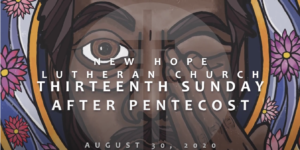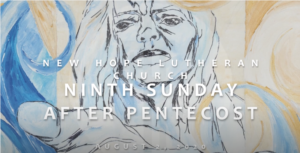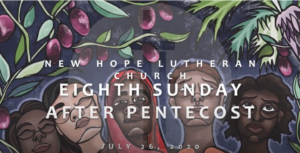Close
Log In using Email

Seventh Sunday after Pentecost 2020
Matthew 13:24-30, 36-43
24 Jesus put before the crowd another parable: “The dominion of heaven may be compared to householder, a lord, who sowed good seed in the field; 25 but while everybody was asleep, an enemy came and sowed weeds among the wheat, and then went away. 26 So when the plants came up and bore grain, then the weeds appeared as well. 27 And the servants of the householder came and said, ‘Lord, did you not sow good seed in your field? Where, then, did these weeds come from?’ 28 The householder answered, ‘An enemy has done this.’ The servants said, ‘Then do you want us to go and gather them?’ 29 But the householder replied, ‘No; for in gathering the weeds you would uproot the wheat along with them. 30 Let both of them grow together until the harvest; and at harvest time I will tell the reapers, Collect the weeds first and bind them in bundles to be burned, but gather the wheat into my barn.’”
36 Then Jesus left the crowds and went into the house there. And his disciples approached him, saying, “Explain to us the parable of the weeds of the field.” 37 Jesus answered, “The one who sows the good seed is the Son-of-humanity; 38 the field is the world, and the good seed are the children of God’s dominion; the weeds are the children of the evil one, 39 and the enemy who sowed them is the devil; the harvest is the end of the age, and the reapers are the angels. 40 Just as the weeds are collected and burned up with fire, so will it be at the end of the age. 41 The Son-of-humanity will send the angels, and they will collect out of God’s dominion all causes of sin and all evildoers,
42 and they will throw them into the furnace of fire, where there will be weeping and gnashing of teeth. 43 Then the righteous shall shine like the sun in the dominion of God. Let anyone with ears listen!”
---------------
Please pray with me this morning, church:
Nurturing God,
In the midst of the unraveling happening all around us,
We long to be planted in your field,
And nourished with the refreshing rains you send.
In the midst of the struggles within ourselves
Between wheat and weeds,
Keep us mindful that, above all, we are yours.
Amen.
---------------
Have you taken time out to sit with your thoughts over the past 4 months?
Whether early in the morning with your coffee, or late at night after the kids are finally asleep, or some other time, have you taken time to just stop, breathe, and sit with your thoughts?
How’d that go for you?
What was it like? Did you like it?
Or is your mind, like mine, a pretty scary place to be right now?
New case numbers, hospitalizations, “What was that meeting I had today?”, checking in with this friend or that loved one, “I’m sorry, we’re doing what for school this next year?!”, safety precautions, how to stay healthy, “I really need some time off, but I can’t go anywhere!”……
It’s a lot. A tremendous amount, actually.
How do we keep it together in the midst of all of this?
How do we sort through what is needful and what is helpful, and how do we manage well all the other stuff that if it builds up and comes out sideways, it ends up manifesting itself as frustration, anger, grief, anxiety, hurtful words, and other painful things?
When I think of untangling, I think of a ball of yarn or string or twine. I think of the strands of Christmas lights that you just throw in the box at the end of each season and so you have to unknot them all and lay them all out before you can put them up again. I think of my headphones, that no matter how hard I try, no matter how carefully I wind them around my hand and place them gently in my bag, it’s always a 10-minute ordeal to pull them out and untangle them so that they’re usable again.
Part of unraveling is that it allows us to disentangle.
Like separating the wheat from weeds, the disentangling—the unraveling—allows us to sort through what is needful and helpful and set aside that which is not.
I mentioned last week that sometimes it’s not so helpful when the gospel writers insert their explanations of Jesus’ parables into the gospel narratives. This is one of those times. See because the writer of the gospel of Matthew’s explanation is so…simplistic. You read the 2nd half of the gospel lesson and everything is so neatly packaged, everything’s explained, so like, what’s the use of preaching, right?
Jesus hardly ever explained the parables he told, and that’s exactly the nature of parables. Parables are mysterious. They invite us into their story and ask us to consider what God might be saying to us. And it’s never the same each time. And it’s certainly not the same for every person. So how do we hold together this idea that parables have many different facets, and many different entry points, and many different exits, and many different interpretations; while at the same time holding on to this rare occurrence of Jesus’ explanation of a parable? It can tie us up in knots trying to figure it out.
On the one hand, we’d love to take Jesus at his word; that the children of the kingdom are the wheat, and the children of the evil one are the weeds, and at the end of the age the evil ones get burned up and the good ones are collected by the caretaker.
That the world is simply wheat and weeds, you’re either one or the other, and that’s that.
Like, that’s pretty cut and dry, and it fits nicely with my ideas about how the world should work. It fits nicely with my ideas about justice. How great it would be if all of Jesus' teachings came with such a handy interpretive key and instruction manual, right? How wonderful it would be if all of life came with such a cut-and-dry instruction manual… Life would be so much…simpler…
We like to think that the world is simply weeds and wheat; that which is bad gets plucked up and burned, and that which is good is harvested and used to feed the world. But that’s not the nature of parables…nor is it the nature of the world we live in; it’s so much more complicated than that.
I have many least favorite activities when it comes to yard work, but one of my least least favorite is pulling weeds. It’s a pain, I don’t like it, and it seems like such a great amount of effort for so little reward.
But when I was young, one of my chores was to pull weeds in the flower bed at our house. True confession, I'm a terrible weed puller and an even worse gardener.
My dad would say, "Just grab at the base of the weed and pull straight up."
"Ok. What does a weed look like?" I’d reply.
- "You'll know it when you see it."
- "Ok, is this a weed?"
- "Nope."
- "Oh, what about this one over here?"
- "Yep, that's a weed."
- "Oh ok. Well, this one looks the same as that last one; is this a weed?"
- "Nope."
Loading Discusson...






